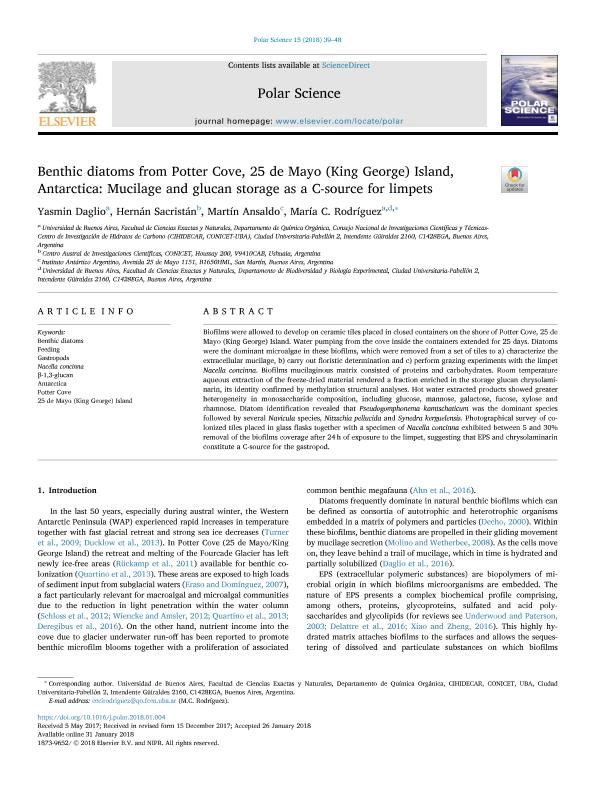Mostrar el registro sencillo del ítem
dc.contributor.author
Daglio, Yasmin

dc.contributor.author
Sacristán, Hernán Javier

dc.contributor.author
Ansaldo, Martin

dc.contributor.author
Rodríguez, María C.
dc.date.available
2019-11-13T21:00:48Z
dc.date.issued
2018-03
dc.identifier.citation
Daglio, Yasmin; Sacristán, Hernán Javier; Ansaldo, Martin; Rodríguez, María C.; Benthic diatoms from Potter Cove, 25 de Mayo (King George) Island, Antarctica: mucilage and glucan storage as a C-source for limpets; Elsevier; Polar Science; 15; 3-2018; 39-48
dc.identifier.issn
1873-9652
dc.identifier.uri
http://hdl.handle.net/11336/88797
dc.description.abstract
Biofilms were allowed to develop on ceramic tiles placed in closed containers on the shore of Potter Cove, 25 de Mayo (King George) Island. Water pumping from the cove inside the containers extended for 25 days. Diatoms were the dominant microalgae in these biofilms, which were removed from a set of tiles to a) characterize the extracellular mucilage, b) carry out floristic determination and c) perform grazing experiments with the limpet Nacella concinna. Biofilms mucilaginous matrix consisted of proteins and carbohydrates. Room temperature aqueous extraction of the freeze-dried material rendered a fraction enriched in the storage glucan chrysolaminarin, its identity confirmed by methylation structural analyses. Hot water extracted products showed greater heterogeneity in monosaccharide composition, including glucose, mannose, galactose, fucose, xylose and rhamnose. Diatom identification revealed that Pseudogomphonema kamtschaticum was the dominant species followed by several Navicula species, Nitzschia pellucida and Synedra kerguelensis. Photographical survey of colonized tiles placed in glass flasks together with a specimen of Nacella concinna exhibited between 5 and 30% removal of the biofilms coverage after 24 h of exposure to the limpet, suggesting that EPS and chrysolaminarin constitute a C-source for the gastropod.
dc.format
application/pdf
dc.language.iso
eng
dc.publisher
Elsevier

dc.rights
info:eu-repo/semantics/openAccess
dc.rights.uri
https://creativecommons.org/licenses/by-nc-sa/2.5/ar/
dc.subject
25 DE MAYO (KING GEORGE) ISLAND
dc.subject
ANTARCTICA
dc.subject
BENTHIC DIATOMS
dc.subject
FEEDING
dc.subject
GASTROPODS
dc.subject
NACELLA CONCINNA
dc.subject
POTTER COVE
dc.subject
Β-1,3-GLUCAN
dc.subject.classification
Otros Tópicos Biológicos

dc.subject.classification
Ciencias Biológicas

dc.subject.classification
CIENCIAS NATURALES Y EXACTAS

dc.title
Benthic diatoms from Potter Cove, 25 de Mayo (King George) Island, Antarctica: mucilage and glucan storage as a C-source for limpets
dc.type
info:eu-repo/semantics/article
dc.type
info:ar-repo/semantics/artículo
dc.type
info:eu-repo/semantics/publishedVersion
dc.date.updated
2019-10-21T19:19:04Z
dc.journal.volume
15
dc.journal.pagination
39-48
dc.journal.pais
Reino Unido

dc.journal.ciudad
Oxford
dc.description.fil
Fil: Daglio, Yasmin. Consejo Nacional de Investigaciones Científicas y Técnicas. Oficina de Coordinación Administrativa Ciudad Universitaria. Centro de Investigaciones en Hidratos de Carbono. Universidad de Buenos Aires. Facultad de Ciencias Exactas y Naturales. Centro de Investigaciones en Hidratos de Carbono; Argentina
dc.description.fil
Fil: Sacristán, Hernán Javier. Consejo Nacional de Investigaciones Científicas y Técnicas. Centro Austral de Investigaciones Científicas; Argentina
dc.description.fil
Fil: Ansaldo, Martin. Instituto Antártico Argentino; Argentina
dc.description.fil
Fil: Rodríguez, María C.. Universidad de Buenos Aires. Facultad de Ciencias Exactas y Naturales. Departamento de Biodiversidad y Biología Experimental; Argentina. Consejo Nacional de Investigaciones Científicas y Técnicas. Oficina de Coordinación Administrativa Ciudad Universitaria. Centro de Investigaciones en Hidratos de Carbono. Universidad de Buenos Aires. Facultad de Ciencias Exactas y Naturales. Centro de Investigaciones en Hidratos de Carbono; Argentina
dc.journal.title
Polar Science
dc.relation.alternativeid
info:eu-repo/semantics/altIdentifier/doi/https://doi.org/10.1016/j.polar.2018.01.004
dc.relation.alternativeid
info:eu-repo/semantics/altIdentifier/url/https://www.sciencedirect.com/science/article/pii/S1873965217300567
Archivos asociados
